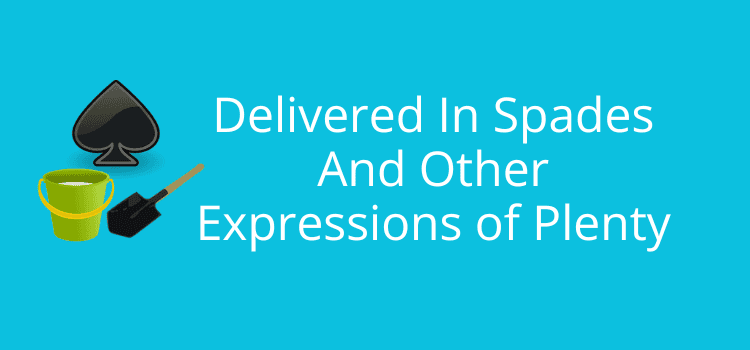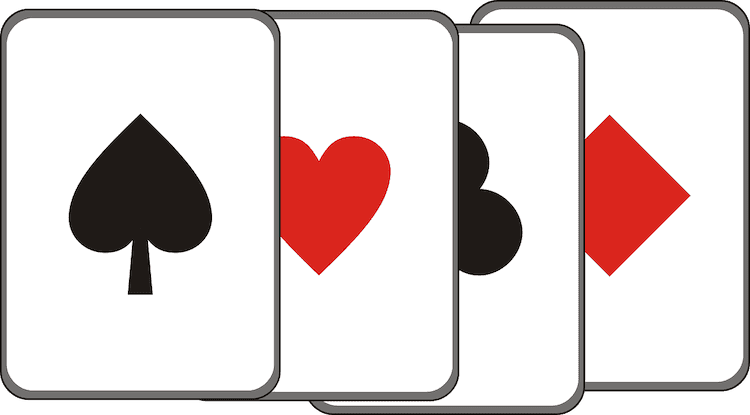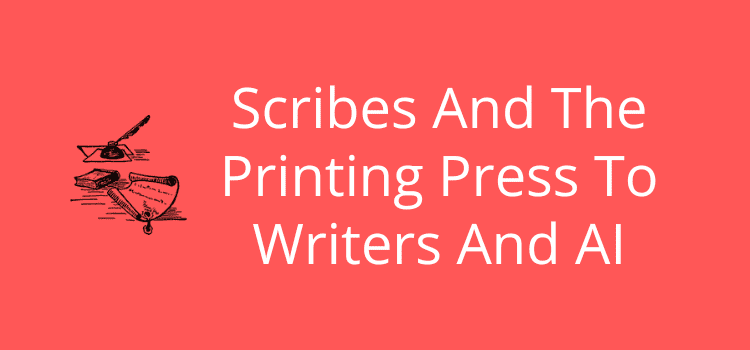
When someone says something was delivered in spades, they refer to an experience or service that exceeded expectations.
It’s a phrase that suggests generosity or excellence far beyond the normal.
But what are the origins of the expression?
And how does it compare to other ways of describing excess or plenty?
What does deliver in spades mean?

Because shovel and spade are synonyms, you might imagine that the expression’s origins come from shoveling extra amounts. But that is not the case.
The fixed phrase to deliver in spades has its roots in card games, specifically bridge and poker, where spades are often considered the highest-ranking suit.
In these games, having a lot of spades can give a player a significant advantage, so the suit is associated with power and strength. This association with strength evolved to imply not just having something but having it in abundance and with impact.
When someone says a service or quality was delivered in spades, they emphasize that it went above and beyond expectations.
In today’s usage, the phrase often implies more than quantity because it can also suggest quality. It’s not just about having a lot of something but having a lot of something good.
For instance, their hospitality was delivered in spades, implying that it was generous, thoughtful, and memorable.
Using the phrase conveys an impressive or even unforgettable experience. It’s more dramatic than simply saying a lot or very much.
This makes the phrase ideal for situations where you want to describe an experience or outcome that truly stood out.
It’s a memorable way to add extra emphasis to a positive experience or quality.
Buckets and loads: The other abundance expressions
While in spades brings an image of strength and power, expressions like buckets and loads also capture the idea of abundance, but in a different way.
Saying something was in buckets suggests an image of something overflowing or pouring out uncontrollably.
For example, sweating in buckets vividly portrays someone sweating profusely, far beyond normal.
Similarly, buckets of laughter can imply laughter that’s constant, infectious, and possibly a little over the top.
Unlike spades, which has a serious, almost intense feel, in buckets is often a playful or exaggerated expression.
It’s useful for adding humor or emphasizing abundance in a way that feels larger than life. This makes it perfect for describing high-energy situations or emotions where you want to create a lively image in the reader’s mind.
Imagine describing a party where people were having fun in buckets—you immediately sense a scene of lively, joyful chaos.
Loads, on the other hand, is the most practical and neutral of these expressions. When people say in loads, they typically refer to quantity rather than quality or intensity.
You might hear loads of options or loads of work, which implies a lot, but without necessarily describing the vivid images of buckets or spades.
While in loads still conveys plenty, it’s more understated and less specific about the quality or intensity of the abundance.
It is perfect if you’re talking about a situation where something is simply plentiful, like loads of snacks at the meeting or loads of projects on the table.
It’s also useful when you want to sound relaxed or conversational without the stronger punch of the other two expressions.
Loads is the most casual and straightforward choice compared to spades and buckets.
In short, buckets feels playful and overflowing, loads is casual and neutral, and in spades is bold and impactful. Knowing the subtle differences can help you add the right tone to your descriptions of abundance.
The key differences in tone and impact
While each phrase implies an impressive amount, the tone you set with each can vary quite a bit.
Here’s a quick summary.
Spades
This expression has a dramatic feel, emphasizing both abundance and excellence.
It’s great for highlighting powerful or memorable qualities.
The team promised innovation and delivered it in spades, transforming the entire project with their creativity and skill.
Her kindness was apparent from the moment they met, and it showed in spades when she went out of her way to make him feel welcome.
Buckets
Playful, colorful, and full of energy, this expression is ideal for exaggerated descriptions of quantity or emotion.
It’s vivid and fun, adding humor or excitement.
By the end of the game, they were sweating in buckets, but the laughter and fun made it all worth it.
The concert had excitement in buckets, with fans cheering wildly and singing along to every song.
Loads
The most relaxed and neutral option, loads, is perfect for everyday language when you want to convey abundance without extra drama.
There were loads of snacks at the party, enough to keep everyone happily munching all night.
She’s got loads of experience in marketing, so she’ll be a great addition to the team.
Bucketloads
Bucketloads is a fun way to add a bit of exaggeration while combining the imagery of buckets and loads.
We often use it to describe an overwhelming amount in an energetic or enthusiastic way.
They brought bucketloads of energy to the project, keeping everyone motivated and engaged from start to finish.
The festival was packed with bucketloads of entertainment, from live bands to food stalls and games for the kids.
Choosing the expression can change the tone of your description, whether you’re aiming for impact, a bit of humor, or a simple note of plenty.
Summary
If you’re writing about an experience or service that left a strong impression, delivering it in spades is a great way to emphasize that it exceeded all expectations.
For descriptions that need a lively, exaggerated touch, buckets or bucketloads gives you a playful, informal tone.
Loads work well for straightforward abundance without much embellishment, especially in casual or practical contexts.
These expressions are all ways of describing abundance, but each one brings a slightly different sense.
Choosing the one that best suits your tone can add a little extra zing to your writing and make your descriptions more vivid, impactful, or simply easier to read.
After all, sometimes, the words we choose to convey a lot can make all the difference for a text.
Related Reading: Fish And Fishes – Fish Is An Uncountable Noun, Usually
Share This Article


